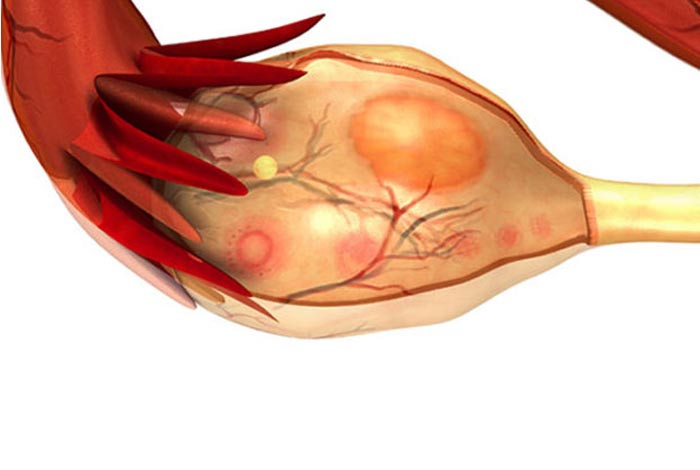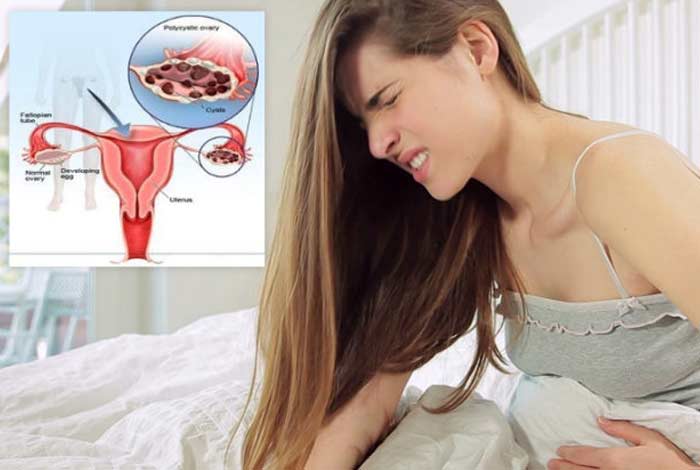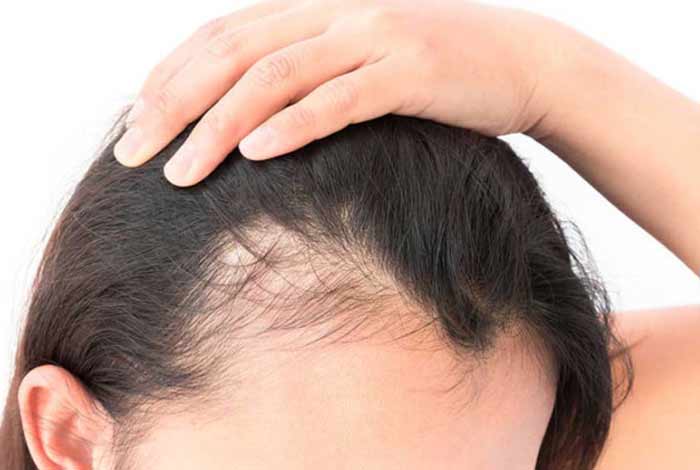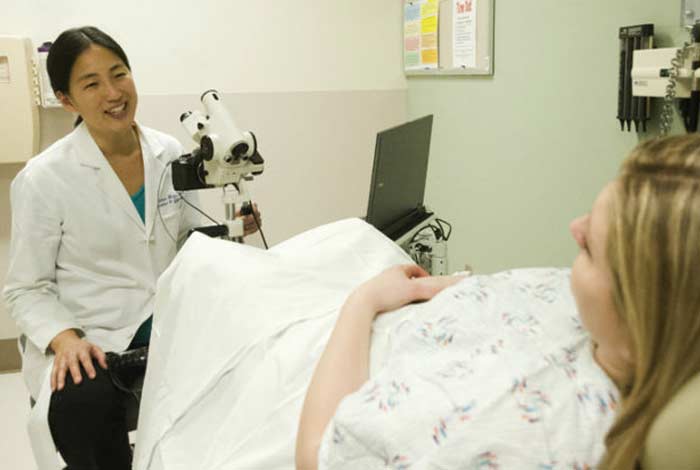
Overview and Facts
Ovaries are a part of female reproductive system that are connected to the uterus through a thin membrane and lie in the abdomen. These are responsible for producing the female reproductive cells or ova and also hormones that are useful in maintaining overall health of women. They secrete two female hormones, estrogen and progesterone, which play an important role in regulating menstrual cycle and fertility. The ovary undergoes a number of stages, beginning in the prenatal stage and continued up to menopause.

Polycystic ovary syndrome (PCOS) is a metabolic disorder affecting women in their reproductive age, arising due to hormonal disorder. Patients suffering from PCOS have numerous small cysts in their ovaries which are formed when the regular changes happening in the ovaries during a normal menstrual cycle get disrupted. Ovaries develop numerous small cysts, which are sac-shaped structures, usually filled with fluid. These cysts are not harmful but cause hormonal imbalance. Women with PCOS have infrequent or prolonged menstrual cycles along with excess male hormone levels. PCOS can pose problems for women who are trying to get pregnant, as the eggs in their ovaries are not released. Even if they become pregnant, they are at a higher risk of developing complications during pregnancy, labor and delivery.
For unexplained reasons, the ovaries start producing male hormones in larger amounts than required which stops ovulation in women having PCOS. Due to the excessive male hormone, women develop excess facial and body hair, male pattern baldness and severe acne.
Women having PCOS are thrice more likely to have a miscarriage as compared to women not suffering from PCOS. They are also at an increased of developing gestational diabetes, preeclampsia, have a larger baby and undergo premature delivery. All these conditions can lead to difficult delivery or might require a cesarean delivery.
PCOS is increasingly becoming a common problem among women. Nearly 5-10% of women in the childbearing age in the U.S.A are suffering from PCOS. There are less than 50% cases that are correctly diagnosed. The U.S government spends nearly 4 billion USD annually in diagnosing and managing PCOS.
Difference among Polycystic Ovary (PCO), Polycystic Ovary Disorder (PCOD) and Polycystic Ovary Syndrome (PCOS):

There is a widespread confusion among women in understanding the difference among the terms polycystic ovary (PCO), polycystic ovary disorder (PCOD) and polycystic ovary syndrome (PCOS).
In order to understand this difference among these terms, it is essential to understand the difference between disorder and syndrome. Disorder refers to an abnormal mental or physical condition of body or a part of body. A syndrome refers to a collection of clinically recognized signs and symptoms that often accompany a particular disease together.
PCO: An ultrasound scan image of ovaries that shows multiple cysts is called polycystic ovary or PCO. It is very common and affects about a third of the women in childbearing age. PCO is not a disease but is a variant form of normal ovaries. There can be a number of reasons responsible for resulting in a polycystic ovary. Women with PCO do not struggle with conception. Women with PCO do not show any symptoms and it is only determined accidentally. Women with PCO might have hormonal imbalance and still continue to ovulate regularly.
PCOD: Polycystic ovary disorder refers to a situation in which an enlarged ovary is observed, containing small, follicular cysts, 0.5 to 1.0 cm in diameter. It develops solely due to hormonal imbalance, causing mature eggs to collect in the ovary as they cannot be discharged. The term cyst is used for referring to these immature follicles. Formation of one cyst leads to development of other cysts and the vicious cycle continues.
PCOS: Polycystic ovary syndrome (PCOS) refers to a metabolic condition that might or might not present itself with polycystic ovaries. In order to be diagnosed with PCOS, a woman must fulfill at least two out of the following symptoms:
1. Polycystic ovaries in the ultrasound scan
2. Irregular menstrual cycles
3. Increased level of male hormone, testosterone in blood along with excessive facial hair and acne.
Therefore, a woman having irregular periods and excess of testosterone in her blood might have PCOS, without having multiple cysts in her ovaries. However, other conditions like pituitary and thyroid dysfunction need to be ascertained before diagnosing PCOS. Women with PCOS are at a risk of developing associated risks like diabetes, obesity, cardiovascular disease, complicated pregnancy and endometrial cancer. Women with PCOS start showing their symptoms in their teen years. It develops primarily due to hormonal imbalance. These women face problems in getting pregnant.
Types and Symptoms of PCOS

Types of PCOS:
PCOS can be divided into following types:
1. Insulin Resistant PCOS: Also referred to as Type 1 PCOS, it is the type of PCOS showing classic symptoms of PCOS like weight gain, facial hair, acne, male pattern baldness and ovulatory interruptions. These women are also at a higher risk of developing diabetes and increased the level of testosterone, both of which actually resulting due to insulin and leptin resistance.
2. Non-Insulin Resistant PCOS: It is also known as Type 2 PCOS and presents itself with all diagnostic criteria of PCOS without insulin resistance. A number of factors can contribute to its development, like thyroid disease, adrenal stress, vitamin D deficiency, hormone-disrupting toxins or iodine deficiency.
3. Others: Although the above-mentioned types of PCOS describe its most typical presentations, there are some other types of PCOS, namely
a. Type 1 PCOS: It is the classical type of PCOS with increased testosterone level, insulin resistance and ovulatory issues.
b. Type 2 PCOS: It is the non-insulin resistant type of PCOS presenting itself with high testosterone level and ovulatory issues.
c. Non-Traditional PCOS 1: It is a type of PCOS with normal testosterone level, obesity, ovulatory issues and insulin resistance.
d. Non-Traditional PCOS 2: A type of PCOS with normal ovulatory patterns, mild insulin resistance and increased testosterone level.
e. Idiopathic Hirsutism: Increased testosterone levels, normal ovulatory patterns and no insulin resistance are the features of this type of PCOS.
Symptoms of PCOS:

PCOS often goes undiagnosed because its diagnosis is difficult. The kind of symptom displayed and its occurrence varies largely among the patients. It is often observed in women who are obese or overweight. But, this is not always true. Many women, having a lean body frame are also known to suffer from PCOS.
It is highly unfortunate that nearly 50% of women having PCOS never get diagnosed and therefore, it is often referred to as the ‘silent killer’.
Some of the commonly observed symptoms of PCOS are: [1]
• ‘String of pearl’ cysts on the ovaries
• Irregular menses
• Infertility
• Insulin resistance
• Excessive hair growth on face and body (hirsutism)
• Acne
• Male pattern baldness
• Dark, thick patches of skin on the neck, arms, breasts or thighs
• Skin tags in the armpits or neck area
• Pelvic pain
• Anxiety or depression
• Sleep apnea
Risk factors of PCOS

Following factors increase the chances of a woman developing PCOS:
• Obesity
• Sedentary lifestyle
• Age
• Hereditary
• Family history of diabetes mellitus
• Insulin resistance
• Hyperinsulinemia
• Increased levels of androgens
• Low levels of follicle stimulating hormone
• Consuming or chronic use of anti-depressant and anti-epileptic drugs
• Late night shift workers, in whom the circadian rhythm becomes irregular
• Smoking
• Excessive consumption of alcoholic drinks
Do I Have PCOS?

Some of the possible symptoms of PCOS are irregular or absent periods, male pattern baldness or thinning of hair, problems of acne and abnormal hair growth. If you have PCOS, you are at a high risk of having obesity, infertility, insulin resistance and recurrent miscarriage. If you are at a high risk of developing PCOS and face the above-mentioned symptoms, consult your doctor. However, there are a few other conditions that can cause symptoms resembling PCOS, like high levels of prolactin and adrenal hormones, Cushing’s syndrome, Tumors of ovary or adrenal gland producing male hormone and thyroid problems. Your doctor will run a number of tests to determine what is causing your symptoms.
Causes and Prevention of PCOS

The exact cause of PCOS still remains unknown, but some factors are known to cause PCOS, such as:
1. Genes: Studies indicate that PCOS is hereditary in nature. It is thought that there are a number of genes contributing to the condition.
2. Insulin Resistance: It has been found that nearly 70 percent of women with PCOS also show resistance to insulin. Insulin is a hormone produced by the pancreas for enabling the cells to utilize glucose for energy production. When there is insulin resistance, cells are unable to use insulin properly and there is an increased demand in the body for insulin. To meet this demand, pancreas makes more insulin. This excessive insulin indicates the ovaries to synthesize more male hormones, which does not allow the formation of follicles and prevents proper ovulation. Follicles are sacs found in the ovaries where eggs mature. Due to improper ovulation, the patient faces a number of problem in getting pregnant.
3. Obesity: It is one of the major reasons for insulin resistance. Obesity and insulin go hand in hand in increasing a woman’s risk of developing type II diabetes.
4. Inflammation: Women with PCOS are often observed to have increased levels of inflammation in their body. Obesity can also contribute to inflammation. Studies indicate that excess inflammation causes androgens levels to increase, causing menstrual and other problems.
5. Hormone Imbalance: Most of the women with PCOS are observed to have an imbalance in some hormones, like:
• Increased levels of testosterone, which is a male hormone is also present in small quantities in females. Imbalance in levels of testosterone can often lead to PCOS.
• Increased levels of luteinizing hormone (LH), which is a hormone responsible for stimulating ovulation. However, if its levels are too high, it can have an abnormal effect on the ovaries.
• Decreased levels of sex hormone-binding globulin (SHBG)–a protein found in the blood, which is responsible for binding testosterone and reducing its effectiveness.
• Increased levels of prolactin (only in some women with PCOS)– which is a hormone stimulating the breast glands for producing milk after pregnancy.
Imbalance in the levels of these hormones happens due to unknown reasons. It is postulated that these imbalances begin in the ovary itself or in other glands that produce these hormones, or even in the part of brain that is responsible for stimulating their production. It is also thought that these changes might be caused due to resistance to insulin. [2]
Diagnosis and Tests of PCOS

There is no definitive test to diagnose PCOS. Specialists take a complete medical history of the patient, including her menstrual cycle and weight changes. A physical exam is conducted in which the doctor looks out for signs of excess hair growth, acne and resistance to insulin. Following tests are also done:
Pelvic Exam: There is visual and manual examination of the patient’s reproductive organs for growths, masses or any other abnormalities.
Blood Tests: These are done to determine the levels of hormones like human chorionic gonadotropin (hCG), testosterone, prolactin and thyroid-stimulating hormone (TSH) levels in the body, which can help in eliminating conditions that can mimic PCOS. Additional blood tests might be performed to determine glucose tolerance and fasting triglyceride and cholesterol levels.
Ultrasound: Through ultrasound, the ovaries and the thickness of uterine lining are examined.
If the doctor suspects that the patient indeed has PCOS, following additional tests might be performed:
• Periodic tests of blood pressure, cholesterol and triglyceride levels, and glucose tolerance.
• Screening tests for anxiety and depression
• Screening test for obstructive sleep apnea
• Screening tests for uterine (endometrial) cancer
PCOS is diagnosed when other causes for the symptoms have been ruled out and the patient meets at least two out of these criteria, which are:
• Irregular or infrequent periods, indicating that there is irregular ovulation
• Blood tests showing high levels of “male hormones”, like testosterone
• Scans showing polycystic ovaries
Treatment and Care of PCOS

At present, there is no cure for PCOS. However, with lifestyle changes and medicines, it can be managed.
1. Lifestyle Changes: In women who are overweight, achieving a healthy body mass index (BMI) can help in improving the symptoms of PCOS. Regular exercise and a healthy and balanced diet can help in reducing weight and prevent the development of long-term health problems.
2. Medicines: There are a number of medicines that are available for treating different symptoms associated PCOS. These are:
a. Irregular or Absent Periods: Contraceptive pills might be prescribed for inducing regular periods. Also, progesterone tablets might be given intermittently for 3-4 months for helping the patient in having regular periods. These medicines also help in reducing the risks of developing endometrial cancer which is a cancer of inner lining of womb, endometrium. The chances of developing this cancer increases when the woman does not have regular periods as the inner lining is regularly shed off every month through menstruation. In the absence of regular period for about a year, there is a chance of development of pre-cancer cells in the uterine lining. This phenomenon is called endometrial hyperplasia. Other hormonal methods of contraception like intrauterine system (IUS) can be used for maintaining a thin uterine lining without inducing periods.
b. Fertility Problems: With treatment, it is possible for most of the women to get pregnant. By taking a small course of medicines taken at the beginning of each cycle for several cycles, chances of getting pregnant can be increased. If these are unsuccessful in meeting the goal, injection or in-vitro fertilization (IVF) techniques can be suggested. However, there occurs a risk of multiple pregnancies with these treatments.
Clomifene, an ovulatory stimulant, is generally prescribed as the first line treatment for women with PCOS who are trying to get pregnant. This drug stimulates the release of egg from the ovaries.
If clomifene remains unsuccessful in stimulating ovulation, metformin is prescribed. Metformin is an anti-diabetic drug used for treating type II diabetes. It can lower the insulin and blood glucose levels in the body of women with PCOS. It also stimulates ovulation, promotes regular menstrual cycle and reduces the risk of miscarriage. It also has long-term benefits like lowering cholesterol levels and the risks of cardiovascular disease.
Letrozole and tamoxifen, belonging to the class aromatase inhibitor and selective estrogen receptor modulator (SERM), can be used for fertility treatment. Letrozole and tamoxifen, both are generally used for treating breast cancer but can also be used for inducing ovulation.
If these oral medications fail, another class of drugs, gonadotropins are prescribed. These drugs carry the potential of overstimulating the ovaries and cause multiple births.
The doctor will also check if the fallopian tubes are open or not before starting any of the fertility treatments.
c. Unwanted hair growth and hair loss: Some of the medicines used for controlling excessive hair growth (hirsutism) and hair loss (alopecia) are:
• Oral contraceptive tablets containing drugs like cyproterone acetate, ethinylestradiol, desogestrel and drospirenone
• Spironolactone
• Flutamide
• Finasteride
These drugs block the effects of male hormones and suppress their production.
A drug, eflornithine, is used for decreasing the growth of unwanted facial hair. The drug is unable to cure unwanted facial hair effectively then along with it, hair removal products are used for better results.
d. Other Symptoms: Various other drugs are also used for managing other problems that accompany polycystic ovary including:
• Weight loss medication like orlistat if the patient is obese or overweight.
• Cholesterol-lowering medicines for lowering high levels of cholesterol in the blood
• Acne treatments
3. Surgery: Laparoscopic ovarian drilling (LOD) is a minor surgical procedure which might be used for treating fertility related problems arising due to PCOS.
In this procedure, a small cut is made in the patient’s lower abdomen through which a long, thin microscopic known as laparoscope is passed. The ovaries are treated using laser or heat by destroying the tissue synthesizing androgens or the male hormones.
This technique is known to decrease the levels of testosterone and luteinizing hormone (LH) and increase levels of follicle-stimulating hormone (FSH). This helps in correcting hormonal imbalance and the ovaries begin to function normally.
Care for PCOS:

A number of things can help in managing PCOS, like a healthy diet approach, regular physical activity, medicines and complementary therapies. Some of the key features in managing PCOS are:
• A complete understanding of the cause and effect of PCOS on the body
• Consumption of healthy diet
• Medical therapies
• Complimentary therapies like herbal medicines, aromatherapy, reflexology, acupuncture, homeopathy, massage and kinesiology
PCOS and Pregnancy

Risks for Moms-To-Be with PCOS:
Hormonal imbalance can make it difficult for women having PCOS to become pregnant. These women generally have obesity and rely on reproductive technology for getting pregnant. PCOS can increase their risk of developing the following complications throughout their life:
• Type II diabetes
• High cholesterol
• Hypertension
• Stroke
• Sleep apnea
• Increased risk of developing endometrial cancer
Even their pregnancy can be dangerous for them as well as for their baby. They can develop preeclampsia which is a serious condition for both mother and baby-to-be. Gestational diabetes and hypertension are other conditions that can be unsafe for the both of them. Gestational diabetes can lead to having a larger-than-average baby, who is at an increased risk of developing dystocia during delivery in which the baby’s shoulder gets stuck in the birth canal.
Through careful monitoring, most of the symptoms of PCOS occurring during pregnancy can be managed. Insulin therapy can be used for managing blood glucose levels in would-be mom.
Risks for Baby:

PCOS during pregnancy can make things complicated for the baby as well. The newborn will require more close monitoring to make sure that he or she has proper development. Some of the potential risks for the baby are:
• Premature birth
• Miscarriage
• Lower Apgar (appearance, pulse, grimace, activity and respiration) score
• Increased risk of meconium aspiration
• Large for gestational age
For baby girls, there is an additional increased possibility that she will also develop PCOS.
Getting Pregnant with PCOS:

There is a possibility that women might not realize they are suffering from PCOS until they start trying for a baby and face subsequent failures. It is suggested that after trying naturally for a year, if a woman is unsuccessful, she and her partner must get themselves tested.
Weight loss, healthy diet and in some cases, medicines are some of the strategies that can increase a couple’s chances of having a baby. Some of the medicines can also be taken for increasing the fertility like clomifene, letrozole and tamoxifen.
PCOS and Breastfeeding:

If a woman is diagnosed with PCOS, she is required to manage her symptoms even after her pregnancy. However, the symptoms and severity of disease can vary. In some cases, hormonal fluctuations occurring after pregnancy and breastfeeding can change hormonal balance in the body, settling to which will require some time.
Women who develop gestational diabetes can safely breastfeed their newly born babies, even when they are on insulin therapy to manage their blood glucose levels. They are also at an increased risk of developing type II diabetes, later in life which can be decreased by breastfeeding.
Next Steps:
One of the most important things to note about PCOS and pregnancy is the fact that complications are extremely common, which increases the need to take steps for ensuring safe and healthy pregnancy. In order to control PCOS symptoms during pregnancy, patient should talk to her doctor and follow a pregnancy safe exercise regimen along with healthy diet and medicines, as directed.
OTC Medication and Self-Management Methods Available for PCOS

There are no OTC medicines available for managing PCOS. However, some supplements can be taken for effectively controlling PCOS. They are:
• Vitamin D
• Magnesium
• Calcium
• Chromium
• Omega-3 acids
• Vitamin B complex
• Co-enzyme Q10
• Zinc
However, it is advised that these supplements should only be taken under medical supervision.
Self-Management Methods Available for PCOS:

Lifestyle and dietary changes can help in managing the symptoms of PCOS effectively.
A. PCOS Dietary Guidelines:
1. Daily intake of protein should be balanced by an equal intake of carbohydrate. Some of the foods that can help in maintaining this balance are :
• Quinoa
• Brown rice
• Buckwheat
• Amaranth
2. Consuming foods low on glycemic index and glycemic load list. Some of the foods having low glycemic index are:
• Kale
• Broccoli
• Grapefruit
• Apples
• Beans
• Lentils
• Walnuts
• Almonds
3. Having fiber-rich diet for promoting healthy metabolism of estrogen in order to decrease androgen level in the blood. Great sources of fiber are:
• Broccoli
• Celery
• Apples
• Dark leafy vegetables
4. Regular intake of essential fatty acids through some of its rich sources, like:
• Cod liver oil
• Evening primrose oil
• Flaxseed oil
5. Decreased intake of caffeine and alcoholic beverages along with cessation of smoking.
B. PCOS Exercise Guidelines:

Exercise helps to improve insulin sensitivity, shedding excess weight and boosting metabolism in the body. Aaerobic and resistance exercises, together, helped in improving insulin resistance. However, excessive exercise should be avoided as that causes the adrenal gland to overwork and worsens PCOS. Restorative exercises are best for managing PCOS. Walking, lifting weights, Pilates, Zumba and Fertility yoga are the best exercise options. It is recommended to exercise 30 minutes for 5 days a week.
Natural Ways to Cure PCOS
There are a number of naturally occurring methods to manage PCOS. But, it should be kept in mind that it takes around 6 to 12 months for the lifestyle changes and natural supplements to show their effect. Some of the natural methods for effectively managing PCOS are:
• Cod Liver Oil: It is a rich source of omega-3 essential fatty acids which can help women in losing weight, balancing hormones and getting pregnant. It is also known to reduce inflammation in the body.
• Licorice Root: It helps in regulating proper production of hormone in the body. It keeps insulin level under control and maintains liver health.
• Tribulus: It is known to promote regular ovulation in women having PCOS when used before ovulation. It also helps in regulating menstrual irregularities and nourishes the female reproductive tract, especially the ovaries.
• Cinnamon: In a study, cinnamon has shown remarkable ability in reducing insulin resistance in women having PCOS.
• Saw Palmetto: It is herb whose extract is known to inhibit production of dihydrotestosterone, which is the more potent male hormone. This helps in preventing hirsutism in women having PCOS. Endometrial hyperplasia and hormonal acne is also reduced by this herb.
Health Tip by Experts
PCOS is increasingly becoming a common hormonal problem being faced by women all around the world. Although these is no cure for this syndrome, yet it can be managed by making lifestyle and dietary changes. It is also possible to get pregnant and have healthy babies for women with PCOS. With a little precaution, life can be normal for millions of women who have PCOS.






